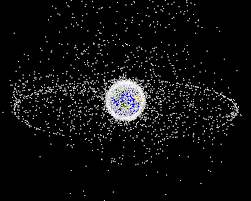Space Protection Initiative
Proposal – Funding the Next Phase of the Space Protection Initiative / Stopping the increase in space debris by deploying Space Debris Removal Insurance Bonds
Space sustainability is fast becoming one of the defining issues of the 21st century. With thousands of defunct satellites and orbital fragments posing increasing risks, space debris threatens not only future exploration but also vital services such as communications, navigation, and climate monitoring. The Space Protection Initiative, originally championed by the 695th Lord Mayor as a thematic focus for the City and supported by Z/Yen during that term, continues to be actively developed and led by Z/Yen today.
Space observation and infrastructure already contribute to 40% of the UN Sustainable Development Goals, particularly those involving climate action, innovation, and sustainable consumption. As Earth’s orbital commons come under strain, coordinated financial and regulatory frameworks are urgently needed to protect this vital environment.

At the heart of the initiative is the proposal to develop Space Debris Removal Insurance Bonds (SPADRIBs) - surety-style financial instruments inspired by models used in decommissioning oil rigs and mines. These bonds aim to make space operators financially responsible for clearing debris, creating economic incentives for cleaner missions.
This slide deck summarises the situation as of October 2024.
Since launch, momentum has grown. A cross-disciplinary coalition of technologists, insurers, policymakers, and academics has formed to explore the technical and financial feasibility of SPADRIBs. Early-stage modelling is underway to understand risk profiles, retrieval costs, and multi-mission efficiencies. Simultaneously, the UK Space Agency has funded two Phase B Active Debris Removal studies with Astroscale and ClearSpace, both working towards demonstration missions by 2026 to remove legacy UK satellites.
The insurance industry has signalled conditional backing. In 2023, a collective 'invitation to treat' was issued offering up to USD 500 million per operator for third-party debris removal, contingent on regulatory and technical benchmarks. Political interest is rising, with MP Mark Garnier suggesting such instruments be dubbed “space junk bonds”.
Since 2023, engagement has deepened. Key milestones include a Mansion House coffee colloquy in December 2023, a Davos panel in January 2024, and the Lord Mayor’s Science & Innovation Banquet in June 2024, where Professor Manahel Thabet launched the Commonwealth Space Collaboration Initiative, supported by all 56 Commonwealth nations. The initiative was further bolstered by a World Economic Forum workshop titled “Financial Space Debris Mechanisms.”
We are now seeking funding and strategic support to move into pilot and regulatory phases.
What funding will support:
- Formal design and regulatory engagement for SPADRIBs
- Development of pilot schemes and simulated debris removal credit markets
- Expansion of modelling tools for risk pricing and underwriting
- Public and private sector workshops across G7/G20 nations
- Communications campaigns to support adoption within licensing regimes
We welcome engagement from funders, foundations, insurers, sovereign bodies, and private sector firms aligned with ESG, sustainable finance, or innovation in orbital infrastructure. A letter of support template is available upon request.
Further reading:
- In-Orbit Servicing & Insurance Markets: A Symbiotic Approach (IAC 2023)
- Summary Notes – Financial Space Debris Mechanisms (June 2024)
- GGFI 12 Supplement – Space Debris: The Tragedy of the Commons (Oct 2023)
Editorial Coverage:
- “The City is where science and finance meet to solve the world’s problems” – City AM, 10 June 2024
- “If space is the ultimate frontier, how do you explain all the rubbish?” – City AM, 18 March 2024
Key Resources:
- NASA – Cost and Benefit Analysis of Orbital Debris Remediation
- FCC – Orbital Debris Report
- Astra Carta Seal – Royal.uk
- UN SDG Space Implementation – UNOOSA
Webinars:
- Waste Of Space: The Problem With Space Debris And The Challenges And Opportunities Associated With Solving it – Graham Turnock, European Space Agency (27 June 2024)
- “More Space, Less Waste” – Nobu Okada, Astroscale (27 July 2023)
- UK Space Agency Futures Forum: Greening Outer Space (12 May 2021)
- “Space: The Final Frontier” – BizTech Huìhuà Chat (22 February 2021)
Further reading:
- In-Orbit Servicing & Insurance Markets: A Symbiotic Approach (IAC 2023)
- Summary Notes – Financial Space Debris Mechanisms (June 2024)
- GGFI 12 Supplement – Space Debris: The Tragedy of the Commons (Oct 2023)
Editorial Coverage:
- “The City is where science and finance meet to solve the world’s problems” – City AM, 10 June 2024
- “If space is the ultimate frontier, how do you explain all the rubbish?” – City AM, 18 March 2024
Key Resources:
- NASA – Cost and Benefit Analysis of Orbital Debris Remediation
- FCC – Orbital Debris Report
- Astra Carta Seal – Royal.uk
- UN SDG Space Implementation – UNOOSA
Webinars:
- Waste Of Space: The Problem With Space Debris And The Challenges And Opportunities Associated With Solving It – Graham Turnock, European Space Agency (27 June 2024)
- “More Space, Less Waste” – Nobu Okada, Astroscale (27 July 2023)
- UK Space Agency Futures Forum: Greening Outer Space (12 May 2021)
- “Space: The Final Frontier” – BizTech Huìhuà Chat (22 February 2021)